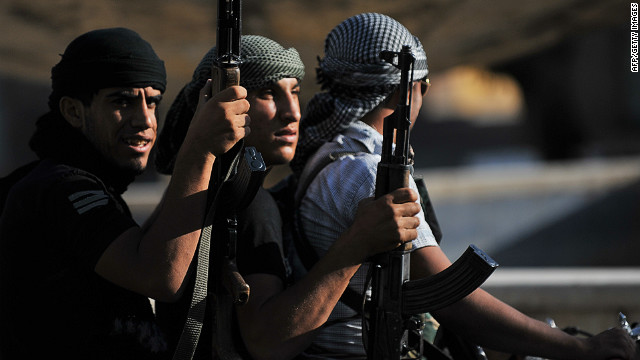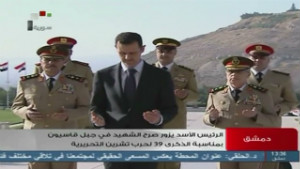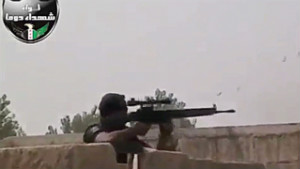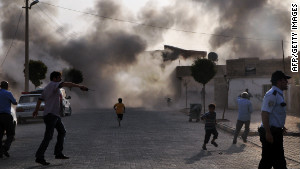
- Report says Syrian rebels are open to the vice president leading an interim government
- U.S. presidential candidate Romney supports arming rebels "who share our values"
- Syrian rebels are trying to capture a military camp near the Turkish border
- Artillery fire flies across the Syrian-Turkish border from both directions
Read a version of this story in Arabic
(CNN) -- After days of Syrian projectiles falling across the border into Turkey, tensions -- and carnage -- are mounting on both sides of the border.
The stray shelling has prompted Turkey to respond with threats and weapons fire, fueling concerns that the Syrian civil war will bleed into a greater regional battle.
Here are the latest developments in the 19-month Syrian crisis:
Turkish foreign minister: Syria's vice president could lead a transitional government
Syrian rebels are open to the idea of the country's vice president leading an interim government, as proposed by Turkey's foreign minister, Turkish media reported Monday.

 Tensions build in Syria
Tensions build in Syria 
 Rebels attack army barracks in Damascus
Rebels attack army barracks in Damascus 
 Turkey-Syria ties strained by violence
Turkey-Syria ties strained by violence But Bessam Dade, political adviser to the rebel Free Syrian Army, said the dissidents would approve of such a plan only if Syrian President Bashar al-Assad is not granted immunity from prosecution, Turkey's TRT news agency said.
Turkish Foreign Minister Ahmet Davutoglu pitched the idea, saying the Syrian vice president is not to blame for the mass bloodshed in the country.
"Farouq al-Sharaa, with a reasonable and conscientious approach, was not a part of recent events and did not partake in the massacres. And perhaps there is no one that knows the system better than Farouq al-Sharaa," Davutoglu told TRT, according to the Turkish Anadolu Agency.
George Sabra, a spokesman for the Syrian National Council, said members of the opposition group will meet in Qatar later this month and will discuss whether the Syrian opposition would accept the proposal.
"But first we need to know what will be the road map that such a transition will be based on," Sabra told CNN. "Whether it is al-Sharaa or anyone else, we need to know first what will this person do, and how he or she will push to get Syria out of this quagmire."
In August, a spokesman for the Free Syrian Army said that al-Sharaa had defected from the government and that rebels were trying to help him flee to Jordan. But al-Sharaa later resurfaced at an official meeting in Damascus.
He has not been seen publicly since, not even when al-Assad made a rare public appearance Saturday and was greeted by other Syrian officials.
On the ground: Rebels say they're close to seizing a military camp
In their quest to wrest control of land near the Turkish border, Syrian rebels stationed outside a military camp in Tal Abyad said they had destroyed three tanks by Monday morning.
"We feel very strongly we will take (the camp) over in the next few hours," rebel fighter Abu Abdallah told CNN.
Government forces have been shelling the surrounding area -- and firing mortar rounds that fell into Turkey -- from the Tal Abyad camp, said Abdallah and Ayham Khalaf, a witness and activist.
If opposition fighters take over the military camp, Abdallah said rebels will control an area that extends 45 kilometers (28 miles) south of the border of Turkey -- a country that has been sympathetic to Syria's opposition movement.
On Sunday, a Syrian shell landed near a Turkish government office in Akcakale -- the same town where five Turks were killed last week in another cross-border incident.
Turkish Prime Minister Recep Tayyip Erdogan said the deadly incident in Akcakale was caused "by artillery fire belonging to the Syrian regime forces." Turkey fired on Syrian government targets in response.
Witness Salih Aydogan said no one was injured in the Sunday incident. As Aydogan spoke, the Turkish military fired two more shells at Syria.
"We heard (the Turkish military) fire back immediately. They retaliated with two shots," Aydogan said. "We just got lucky this time."
But the violence isn't contained to Syria's northern border. Across the country, at least 32 people were killed early Monday -- including 30 in Al-Kark Al-Sharqi, which was pummeled by Syrian government shelling, the opposition Local Coordination Committees of Syria said.
CNN is unable to independently confirm reports of casualties or violence because the Syrian government has restricted access by international journalists.
World reaction: U.S. presidential candidate supports arming rebels
U.S. Republican presidential candidate Mitt Romney is expected to announce his support of Syrian opposition members in a foreign policy speech Monday.
"In Syria, I will work with our partners to identify and organize those members of the opposition who share our values and ensure they obtain the arms they need to defeat Assad's tanks, helicopters and fighter jets," according to excerpts from Romney's prepared speech. The remarks did not say whether the United States should arm the rebels.
"Iran is sending arms to Assad because they know his downfall would be a strategic defeat for them. We should be working no less vigorously with our international partners to support the many Syrians who would deliver that defeat to Iran -- rather than sitting on the sidelines."
Romney is running against President Barack Obama, who has not explicitly called for providing arms to Syrian rebels. The U.S. is helping Qatar and Saudi Arabia, which are arming the opposition, decide which rebels should receive weapons.
Obama's administration has limited aid to nonlethal materials, like communication equipment, and officials have expressed concern about giving weapons to a disparate group of rebels of different levels of trustworthiness, saying they're concerned that some weapons will fall into the hands of terrorists.
In a speech last month at the U.N. General Assembly, Obama pledged American support for those working for a "common good" for Syria -- and sanctions against those causing harm.
"In Syria, the future must not belong to a dictator who massacres his people," he said.
"If there is a cause that cries out for protest in the world today, it is a regime that tortures children and shoots rockets at apartment buildings. And we must remain engaged to assure that what began with citizens demanding their rights does not end in a cycle of sectarian violence."
CNN's Saad Abedine, Gul Tuysuz, Holly Yan, Amir Ahmed and Ivan Watson and contributed to this report.
things to do in australia things to do in chicago with kids things to do in houston this weekend
No comments:
Post a Comment